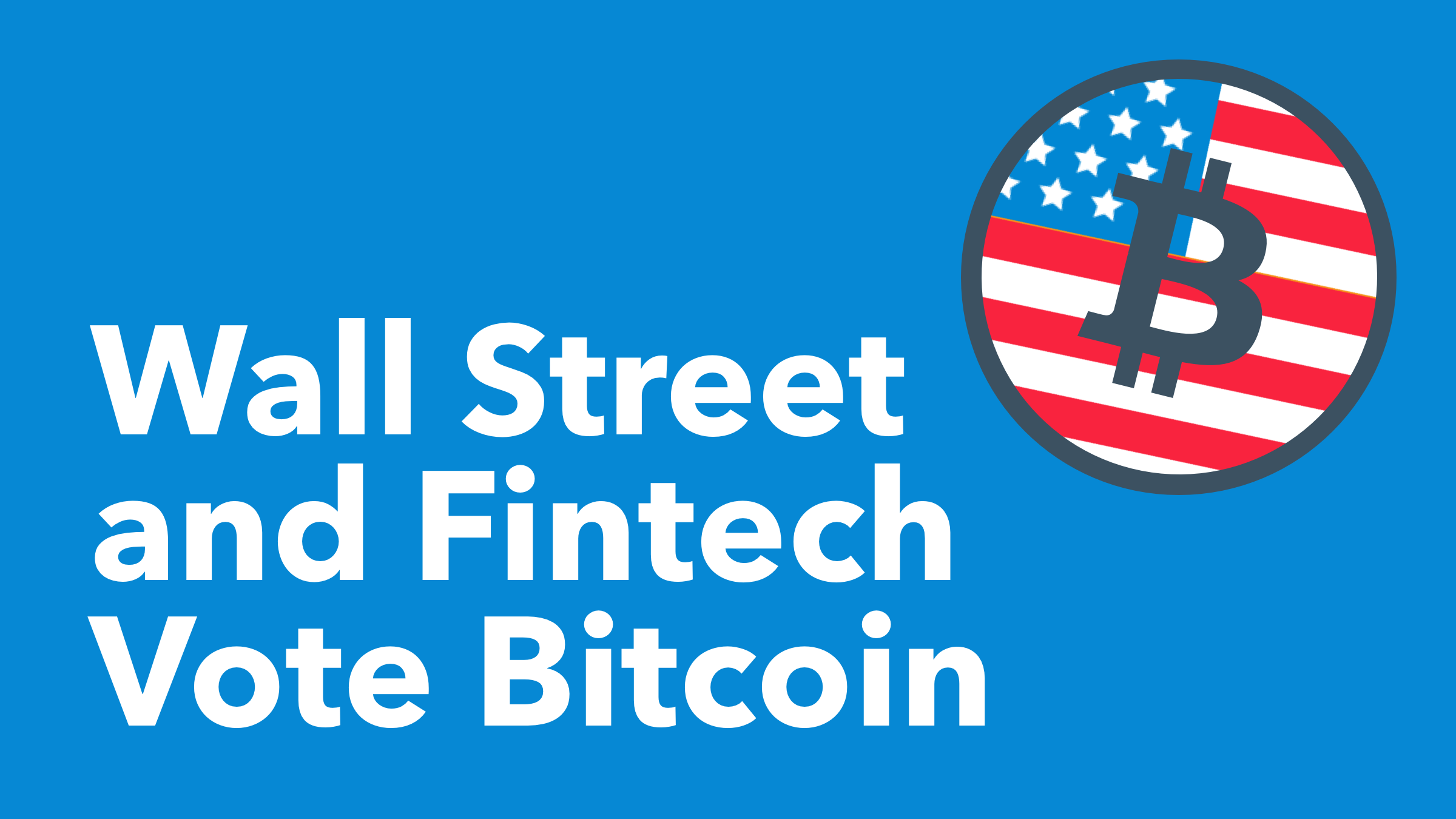Wall Street and Fintech Vote Bitcoin

They say that this time feels different. While bitcoin insiders are no strangers to energetic rallies, the latest boom signals a shift in the catalyst driving the markets.
The last time BTC hit $17,000, it was driven there by enthusiastic retail investors catching the hype wave. At that time, institutional sentiment towards bitcoin as an asset class hovered between apathy and Warren Buffet's infamous 'rat poison' analogy. With bitcoin touching levels not seen in nearly 3 years, the roles have reversed and it is now Wall Street and fintech pushing bitcoin forward.
First Come The Whales, Then The Rest of The Fish
While Buffet and a few other notable investors continue to criticize from the outside, on-chain activity suggests that many ultra-high net worth individuals are beginning to sing a different tune.
According to data from Glassnode, the average value of on-chain transfers is hovering at around 8 BTC per transfer for the last 2 months after being at ~3 BTC since mid-2019. This suggests that well-capitalized entities are getting more involved, while the bulk of retail remains on the sidelines. Bitcoin has only spent 17 days above its current price levels until 2020, representing only 0.4% of its entire lifetime. But the number of long-term holders continues to climb upwards. 62% of all coins have not moved in over a year, an all-time high, suggesting that more and more stakeholders - or at least the whales - are in it for the long haul.
The prospect of a split government in Washington, with Democrats controlling the White House and Congress amidst a Republican majority in the Senate, also bodes well for the ultra-high net worth individuals. A stimulus is likely to pass in Biden's first 100 days, as a number of key picks for Treasury Secretary back the idea of a large package. Both Elizabeth Warren and Janet Yellen, two leading candidates for the position, are in favour of far-reaching measures that will introduce trillions more fiat into the economy. Meanwhile, the appetite for tax hikes on the rich is less-than-expected following the Democrat’s failure to generate a ‘blue wave’ of victories in the Senate, House, and State legislatures. Both the upcoming helicopter money and the idea that their tax rates may not see significant hikes could fuel more institutional allocation towards bitcoin.
At the same time, indicators of retail interest don’t seem to be reflecting the recent jump in the markets. Judging by Google Trends, the search volume for “Bitcoin” is nowhere near the peak 2017 levels, suggesting that retail interest is not there yet. It’s possible that eager retail investors, many of whom got burnt by being in too late in 2017, need bitcoin to break through its all-time high before their interest is peaked yet again.
This may begin to change thanks to PayPal. A month ago, the fintech pioneer announced that it would not only enable bitcoin purchases for its 300 million users, but also allow users to purchase goods and services with bitcoin. Last week, Paypal removed the waiting list for US customers in yet another show of support.
A Growing List of Institutional Bitcoin Bulls
Bitcoin may have a virtuous circle of vindication. The increasing institutional interest is helping to set the stage to normalize bitcoin ownership among the traditional financial institutions, which in turn draws in further institutional eyes.
Just recently, legendary hedge fund investor Stan Druckenmiller hopped on the bandwagon when he revealed that he owns bitcoin and views the asset class as a store-of-value to rival gold. Druckenmiller joins Paul Tudor Jones and other Wall Street luminaries in embracing bitcoin as part of a diversified, risk-adjusted portfolio.
In addition to the individual investors and consumer companies like Paypal braving the new frontier, other public companies are also making bitcoin a core component of their treasury management strategy. Microstrategy, the billion-dollar business analytics company, led the way when they bought 38,250 bitcoin at an average price of $11,100. It was soon joined by Square when the fintech giant announced that, after lengthy engagement in the Bitcoin ecosystem, it too had purchased $50 million worth of bitcoin for its treasury. Companies seeking out safe-haven assets are turning to bitcoin as cash suffers from inflation and a low-to-negative interest rate environment.
Both Microstrategy and Square have CEOs that not only believe in bitcoin, but promote it openly and have become key evangelists in its quest for further mainstream adoption. Square and Microstrategy timed their bitcoin investments perfectly into this rally. Their investments are up 53% and 44%, now worth $650 million and $75.5 million, respectively.
New Entrants Become Evangelists
Perhaps no entity represents the shift in bitcoin sentiment quite like JP Morgan. It’s CEO once fiercely and vocally critical of Bitcoin, the investment bank’s analysts are now touting bitcoin as a legitimate challenger of gold. While JP Morgan and its CEO can hardly be considered full-blown bitcoin bulls, they do represent the now-all-too-common journey of many skeptical institutions.
First, they try to convince the masses that bitcoin is a dangerous speculative asset with no utility. Failing that, they push bitcoin into the ‘ignore’ pile claiming other assets have superior risk-return profiles. When they can no longer turn a blind eye, they warm up to the emergence of bitcoin as an alternative asset class. Before long, these new entrants become bitcoin evangelists, just as it was with Jack Dorsey, Michael Saylor, Paul Tudor Jones, and Stanley Druckenmiller. For these enthusiastic corporate leaders, openly endorsing bitcoin is the logical next step on their journey into crypto.
Whether you’re making your first buy, accumulating a position, or trading daily, buy bitcoin on CoinList today! Bitcoin waits for no one. — https://coinlist.co/dashboard
Legal Notice
This blog post is being distributed by Amalgamated Token Services Inc., dba “CoinList,” or one of its subsidiaries. This blog post and use of the CoinList website is subject to certain disclosures, restrictions and risks, available here.
